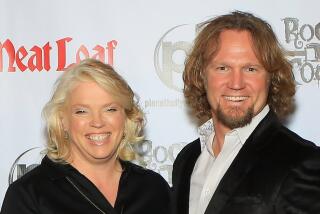Hollywood Union Plays Out Its Own Drama
Like the workers they represent, Hollywood’s blue-collar unions usually go about their business quietly offstage.
Then there’s the notable exception: the local representing workers who decorate sets for movies and TV shows, make props and work as special effects technicians.
For nearly two decades, Local 44 of the International Alliance of Theatrical Stage Employees has been the problem child of Hollywood labor. Armed members once barricaded themselves inside the local’s offices. A judge once ordered it to be taken over. Recently, off-duty Los Angeles police officers were hired to increase security amid reports to the FBI that four members had received anonymous physical threats.
Roiling the 5,700-member local now is a decision last month to pay $170,000 to departing top executive Ronnie Cunningham days before he was to face accusations that he misappropriated funds, demanded cash from people seeking union jobs and awarded insurance money to unqualified members. Voting 10 to 5, the local’s executive board chose to settle with Cunningham rather than pursue the matter and risk lengthy litigation.
“A lot of us are very upset about this,” said veteran set dresser Charlotte Laughon. “The decision to pay him before members could make their own personal judgment about his conduct is insulting to the membership.”
Cunningham was to have faced a proceeding, triggered by complaints from two union members, to decide whether he should be impeached. As part of the agreement to end the matter, Cunningham resigned as business agent and was barred from seeking office with the union. Cunningham said the allegations were fabricated by union rivals, adding that the subsequent withdrawal of the accusations vindicated him.
“It’s all garbage,” Cunningham said. “This was a way to get rid of me.”
Unable to put the controversy to rest, the union remains polarized. Craig Raiche, a veteran prop master who helped build the case, says Cunningham was needlessly let off the hook.
“The evidence was very incriminating, voluminous and compelling,” Raiche said.
Raiche said the allegations had been prompted by findings from a 15-month investigation conducted by Labor Department officials that concluded in February. The local’s executive board considered the allegations so serious that it suspended Cunningham without pay for a month, posted the accusations on the local’s website and ordered an administrative trial in early May.
No federal action was taken after the Labor Department probe. Officials would not say why, nor would they confirm nor deny any investigation took place.
But according to a summary of the Labor Department findings reviewed by the Los Angeles Times, Cunningham allegedly received $230,000 in unauthorized overtime between 1996 and 2001. The pay mostly covered hours that Cunningham and other employees spent on weekends at the union hall in North Hollywood where, according to witnesses cited in the summary, he often passed the time smoking cigars and watching sports on TV.
The document states federal officials found evidence in the form of personal checks that Cunningham allegedly demanded cash payments of $500 or $1,000 each between 2000 and 2004 from union members who were working or seeking jobs.
According to the summary, Cunningham also allegedly helped at least 20 people who weren’t union members get jobs ahead of qualified members, and at one point blacklisted two members. He also allegedly ordered a union employee to perform personal chores for him, including changing the oil in his car, cleaning his backyard pool and installing custom birdhouses at his home.
In an interview, Cunningham denied improperly billing the union for overtime expenses. In addition, former union accountant Torreey Webb said, the local’s board was aware that Cunningham was being paid the money.
“No one ever protested, or said anything about it,” Webb said. “All Ronnie did was work. His life was the union.”
Cunningham said he received personal checks only to cover election expenses, and that he didn’t influence hiring. He acknowledged that a union employee performed some work at his house, but said it was done voluntarily during off hours.
Separate from the Labor Department probe, union members alleged that Cunningham improperly authorized payments of more than $400,000 to cover medical bills and other benefits for ineligible families. Cunningham said that any misallocation was due to computer errors.
An affable Irishman popular with his fellow prop makers, Cunningham, 61, was tapped in 1989 by the international union to help bring Local 44 out of chaos.
In 1987, the local’s leaders had armed and barricaded themselves inside their offices, refusing to surrender control to the parent organization. The international union, which had accused the leaders of mismanagement and having mob ties for allegedly hiring a former associate of onetime Teamsters boss Jimmy Hoffa to intimidate dissidents, eventually went to court to seize control.
Cunningham served as business agent until 2001, when he narrowly lost an election before regaining the job in 2004.
The Labor Department began looking into Cunningham’s actions after a former assistant business agent complained that he misappropriated funds. Last year, pay records, bookkeeping files, board minutes and other documents were subpoenaed.
Last fall, in an interview with industry trade magazine Below the Line, Cunningham said the federal probe was a “vendetta coming from Tom Short,” referring to the powerful head of the international union. A former trustee of the international, Cunningham frequently clashed with Short over contracts.
Short, in an open letter to members, later indirectly referred to Cunningham as ineffective and out of touch with members.
Armed with the Labor Department findings, union members Raiche and Dan Graham in March filed 14 impeachment charges against Cunningham. Typically, the local’s executive board acts as a jury. Cunningham, however, requested a rare trial by a “jury of his peers.”
In the end, it was moot. The executive board, citing potential legal costs, pulled the plug and agreed to pay Cunningham’s salary and benefits through the end of the year.
“I have to say the way it’s been settled is the best for the local,” said Jeannie Gunn, a Local 44 trustee. “Everybody is ready to move forward.”
But dissident directors remain angry, arguing that the union needs to show it is willing to hold its officials accountable.
“I felt it wasn’t fair to the membership,” board member Gene Owens said. “We should have done the right thing.”
More to Read
The biggest entertainment stories
Get our big stories about Hollywood, film, television, music, arts, culture and more right in your inbox as soon as they publish.
You may occasionally receive promotional content from the Los Angeles Times.











